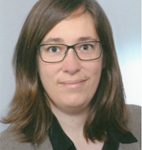Alina Bothe received her M.A. in History, Political Sciences and East and Southeast European History from Freie Universität Berlin, where she also received her Ph.D. in History. She was a Research Fellow at the Center for Jewish Studies Berlin-Brandenburg, and has taught diverse classes at the Freie Universität Berlin, the Humboldt Universität zu Berlin, as well as IES Abroad Berlin. In 2016, she was awarded the USC Shoah Foundation’s Teaching Fellowship for a class where students, under her guidance, researched the biographies of families expulsed from Berlin as Polish Jews in 1938. She is the curator on an exhibition on the expulsion from Berlin, to be shown at the Centrum Judaicum in Berlin July 2018-December 2018. She has also received numerous awards and fellowships including: the post-doctoral fellowship of the Fondation pour la Mémoire de la Shoah (2016-2018), post-doctoral fellowships at the German Historical Institute in Warsaw (2017, 2018), the European Holocaust Research Infrastructure Fellowship (2018), the JDC Archival Fellowship (2018) and the Feldman Travel Grant (2017-2019).
She is the author of “Die Geschichte der Shoah im virtuellen Raum: Eine Quellenkritik” (Berlin: DeGruyter 2018). Most currently, she edited “Ausgewiesen! Berlin, 28. Oktober 1938. Die Geschichte der “Polenaktion” (with Gertrud Pickhan) (Berlin: Metropol 2018) and “Shoah: Ereignis und Erinnerung” (with Stefanie Schüler-Springorum) (Berlin: Hentrich&Hentrich 2018) as well as “Geschlecht und Erinnerung im digitalen Zeitalter. Neue Perspektiven auf ZeitzeugInnenarchive” (together with Christina Brüning) (Berlin: LIT Verlag 2015). She translated the Yiddish novel “Grenadierstraße” (funem yidishn lebn in daythsland) by Fischl Schneersohn into German (Göttingen: Wallstein 2012). Further publications include gender history and conceptual history.
Her current book is on the persecution of Jews with Polish citizenship in the German Reich 1938-1940. The book focuses on the specific persecution of this group based on their citizenship. Dr. Bothe’s book examines an often overlooked key chapter to understanding the history of the Shoah.
 Alina Bothe, Ph.D.
Alina Bothe, Ph.D.